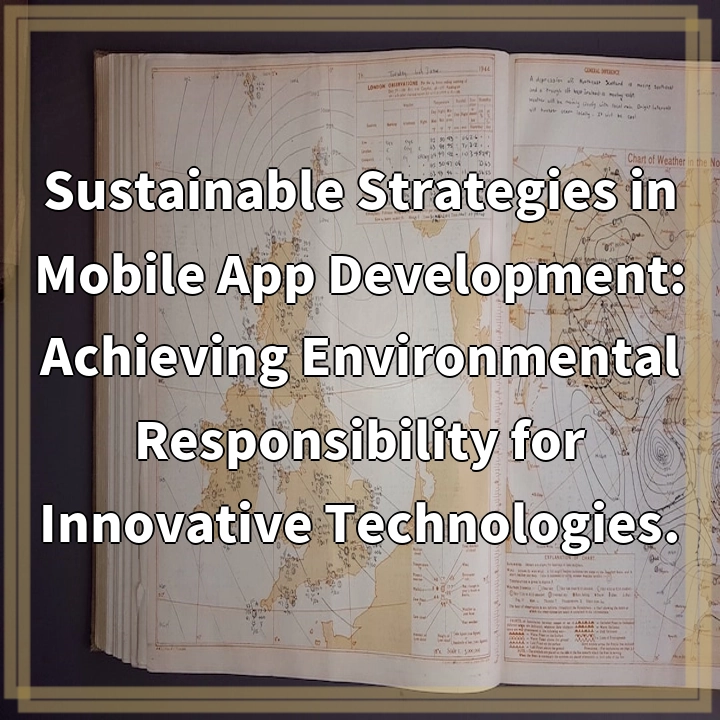
What is Sustainable Strategies in Mobile App Development?
Sustainable strategies in mobile app development refer to the practices and approaches implemented to reduce the environmental impact of mobile app creation and usage. This involves considering the full lifecycle of an app, from its development and deployment to its usage and eventual disposal. By adopting sustainable strategies, app developers aim to minimize resource consumption, reduce carbon emissions, and promote a more environmentally responsible approach to technology development.
Real-World Problems Associated with Sustainable Strategies in Mobile App Development
Despite the growing importance of sustainable practices, there are several real-world problems that hinder the adoption of sustainable strategies in mobile app development:
1. High Energy Consumption
The development and operation of mobile apps require significant energy resources. Data centers that store and process app data consume vast amounts of electricity, contributing to carbon emissions and environmental pollution. Additionally, power-hungry smartphones and tablets further exacerbate the energy consumption associated with mobile app usage.
2. E-Waste Generation
The rapid pace of technological advancement and frequent device upgrades contribute to a growing e-waste problem. Discarded smartphones and tablets contain hazardous materials, including heavy metals and toxic chemicals, that can contaminate the environment if not properly managed. App developers must consider the environmental impact of e-waste generated by mobile devices and work towards extending device lifespan and promoting responsible e-waste disposal.
3. Lack of Awareness and Education
Many mobile app developers and users lack awareness of the environmental impact of their activities. There is a need for increased education and awareness about sustainable strategies in app development, including the importance of energy-efficient coding practices, responsible data management, and the significance of choosing sustainable hosting options.
4. Limited Regulatory Framework
Currently, there is a lack of comprehensive regulations governing the environmental impact of mobile app development. This absence of a regulatory framework can hinder the adoption of sustainable practices and discourage app developers from prioritizing environmental responsibility. Government bodies and industry associations should collaborate to establish guidelines and regulations that promote sustainable strategies in mobile app development.
5. Market Demands and Time Constraints
App developers often face pressure to release new features and updates within tight deadlines to meet market demands. This time constraint can limit the opportunity to incorporate sustainable practices during the development process. Balancing the need for innovation with environmental responsibility poses a significant challenge for app developers.
Conclusion
The adoption of sustainable strategies in mobile app development is crucial to minimize the environmental impact of this rapidly expanding industry. By addressing the high energy consumption, e-waste generation, lack of awareness, limited regulations, and time constraints, app developers can contribute to a more sustainable and environmentally responsible future for the mobile app industry.

Solutions for Sustainable Strategies in Mobile App Development
Addressing the real-world problems associated with sustainable strategies in mobile app development requires concerted efforts from app developers, industry stakeholders, and regulatory bodies:
1. Energy-Efficient Coding Practices
Developers can optimize app code to reduce energy consumption, such as minimizing unnecessary network requests, optimizing algorithms, and utilizing efficient data storage and caching techniques.
2. Cloud Computing and Sustainable Hosting
Utilizing cloud computing and choosing sustainable hosting options, such as data centers powered by renewable energy sources, can significantly reduce the carbon footprint associated with app data storage and processing.
3. Extended Device Lifespan and Recycling
Encouraging users to extend the lifespan of their smartphones and tablets through software updates and repairs can help reduce e-waste. App developers can also promote responsible recycling options to ensure proper disposal of devices when they reach the end of their usable life.
4. Education and Awareness
Increasing awareness about the environmental impact of mobile app development through educational campaigns and industry events can help developers and users make more sustainable choices. Providing resources and guidelines on sustainable practices can promote better decision-making throughout the app development lifecycle.
5. Advocacy for Regulatory Framework
App developers can collaborate with industry associations and government bodies to advocate for the development of regulatory frameworks that promote sustainable strategies in mobile app development. This can include setting energy efficiency standards, encouraging responsible disposal practices, and incentivizing eco-friendly app development.
Conclusion
By implementing these solutions, the mobile app development industry can work towards achieving environmental responsibility and minimizing its environmental footprint. Sustainable strategies can lead to innovative technologies that not only meet market demands but also contribute to a more sustainable and environmentally conscious future for mobile app development.















